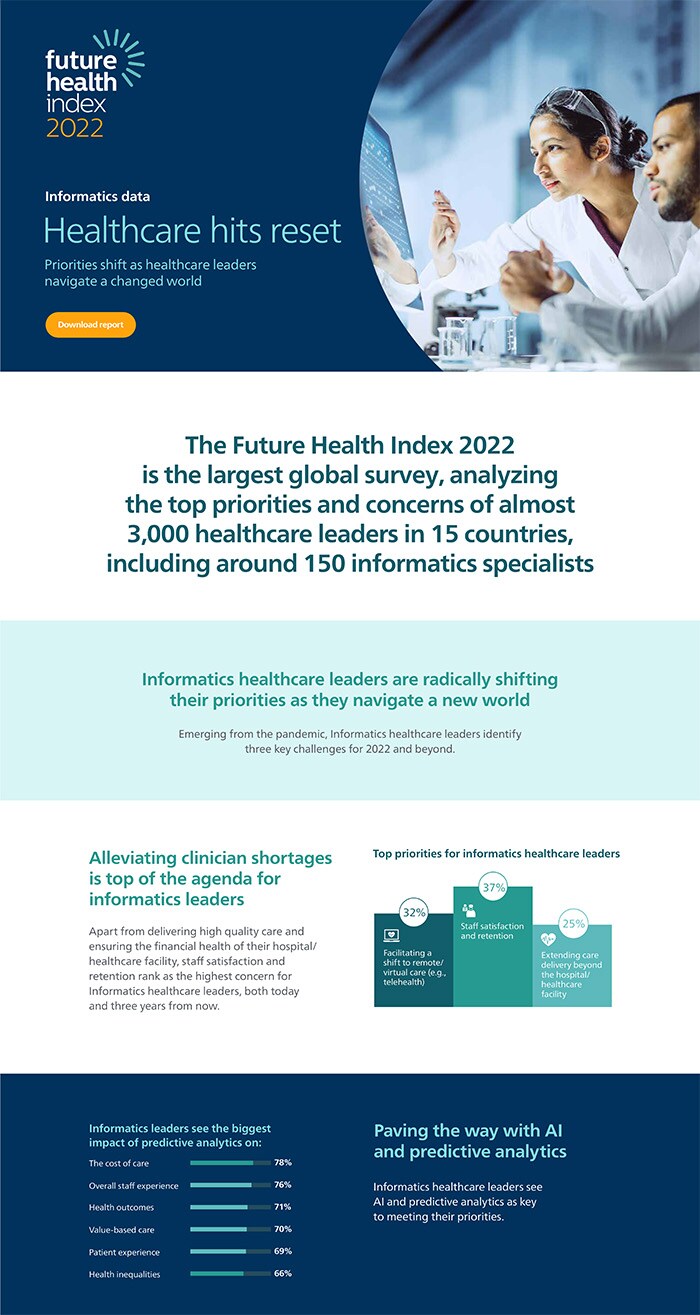The COVID-19 pandemic may not be over, but sufficient lessons have already been learned to prompt a reset in determining how future healthcare systems can deliver high quality care to an aging population while also achieving the resilience needed to cope with future emergencies. Judging by the success of digital channels in maintaining contact with patients and enabling clinicians to collaborate during the pandemic, together with the importance of data in optimizing resource allocation, it is not surprising that healthcare leaders specializing in health informatics are convinced that data has the power to transform the future of healthcare. It’s one of the clear messages that came out in Philips’ Future Health Index 2022 Global Report ‘Healthcare hits reset’ - a unique independent survey of nearly 3,000 healthcare leaders across 15 countries.
Alleviating clinician shortages
One of the challenges informatics healthcare leaders are addressing through better use of data is the current shortage and high burn-out rate of clinicians. More than a third (37%) of those surveyed stated that next to delivering high-quality care and ensuring the financial health of their hospital, staff retention and satisfaction is a high priority. Yet they cite a shortage of in-house data expertise as one of the major impediments to achieving it. Over three quarters (77%) said they had yet to acquire all the expertise needed to fully utilize data. As a result, they are increasingly turning to health technology companies to help ease the situation.

Paving the way with AI and predictive analytics
After staffing issues, innovative care offerings such as telehealth round out the top priorities and investment plans among informatics healthcare leaders. Of those surveyed, almost a third (32%) reported facilitating a shift to remote care as a priority, while a quarter (25%) reported extending care beyond their hospital’s walls as a priority. The survey also revealed they regard artificial intelligence (AI) as key to achieving these objectives, with over two thirds (69%) saying they were currently investing in AI technology.
In addition to AI, informatics leaders are also putting their trust in predictive analytics. Sizeable majorities believed that predictive analytics could have a positive impact on many aspects of providing care, including:
Two thirds (66%) also believe that predictive analytics can also have a positive impact on health inequalities. A plurality of informatics leaders cited improvements in data security and privacy protocols as the top prerequisite to increasing institutional trust in predictive analytics.

No shortage of data
While AI and predictive analytics appear to be essential tools, what about the data needed to feed them? The good news is the majority of informatics healthcare leaders surveyed appear to have confidence in the data available to them, with nearly three quarters (74%) reporting they can already extract actionable insights from it. Nevertheless, several cited a lack of staff training, data overload among staff, and data siloing as impediments to optimal data utilization. Staff training and the availability of data specialists, as well as technology infrastructure investment and better performance metrics, were cited as helpful solutions.
As informatics healthcare leaders look to effectively use data in their organizations, they report working with other hospitals and healthcare facilities (38%) or with health technology companies (33%) as the partnerships are likely to hold the most promise. That puts them firmly in line with the global average for all healthcare leaders surveyed in the Future Health Index 2022 Report.
Now in its seventh year, the Future Health Index 2022 report, based on proprietary research from nearly 3,000 respondents conducted across 15 countries, explores how healthcare leaders are harnessing the power of data and digital technology as they look to address their key challenges coming out of the pandemic. Visit the Future Health Index site for more information on this year’s data and to download a copy of the https://www.philips.com.au/healthcare/resources/landing/forms/download-future-health-index-form-locals-2022
Share on social media
Topics
Contact

Sarah Al-Hashimi Corporate Communications Manager Philips, Australia & New Zealand E-mail: sarah.al-hashimi@philips.com
You are about to visit a Philips global content page
ContinueDownload the infographic














